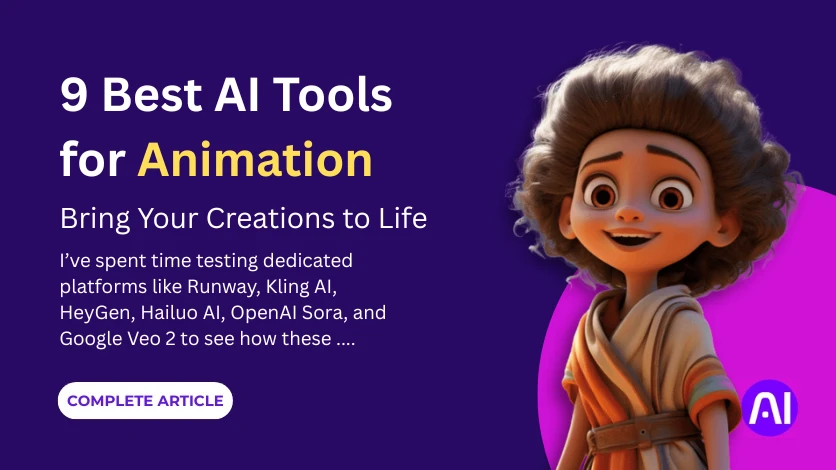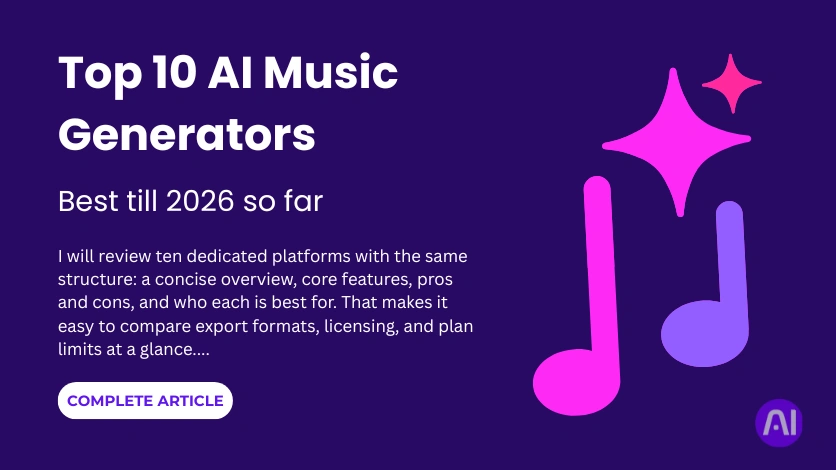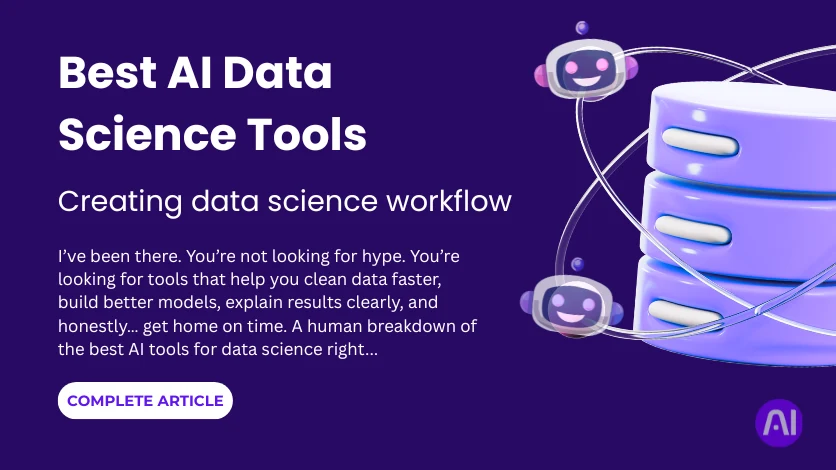The most useful Character AI alternatives include platforms like Janitor AI, ChatFAI, and Inworld AI, offering better roleplay quality, customization, and free or premium options
AI chatbots have changed how we talk to smart characters online. People now use them to tell stories, get help, or just have fun roleplaying. One popular tool is Character AI. It became famous for its lifelike chats and creative features. But it’s not the only option out there, and many users are exploring Character AI alternatives that offer more flexibility.
Many people want a character AI alternative. They’re looking for fewer limits, more freedom, and better results for their goals. Whether you’re a writer, game maker, or someone who wants a virtual AI companion to talk to, this guide will help you find what fits best.
Keep reading to learn about the top AI chatbot alternatives. We’ll show what each one does best, who should use them, and how they’re different. You’ll also find expert tips, real user stories, and answers to popular questions online.
Why Users Seek Character AI Alternatives?
Users look for Character AI alternatives to access more realistic roleplay, fewer chat restrictions, and greater freedom in creating personalized AI characters.
Characteristics of Character AI
- Highly realistic conversations with emotional nuance and personality depth.
- Wide range of pre-built characters spanning anime, history, fiction, and custom creations.
- Web-based and easy to use with no technical setup required.
Character AI is known for real and emotional chats. It has lots of pre-made characters from anime, history, and fiction. You can also make your own. It works in a browser, so you don’t need to install anything or be tech-savvy.
But still, many people search for AI chatbot alternatives. Why? Some want more control, while others want fewer rules. Writers and roleplayers, for example, like tools that let them be more creative, even in dark or adult themes. Character AI blocks that kind of content.
Others care about privacy. They share personal stuff and want local control. Tools like TavernAI or KoboldAI let you keep chats on your device, without tracking.
Speed also matters. Character AI can be slow, and some features are locked behind a waitlist or paywall. That’s why many turn to faster AI roleplay platforms, even if they need a little setup. This is why many users continue to search for better Character AI alternatives.
Limitations of Character AI
- Strict content filters that block NSFW, darker, or mature themes.
- Limited long-term memory, making it hard to sustain ongoing narratives or character growth.
- No local control or offline use, raising concerns about data privacy and customization, which is why users explore more flexible Character AI alternatives.
1. Replika: An AI Companion for Emotional Support
Replika is an AI companion app designed to offer emotional support, meaningful conversations, and a safe space for self-expression.
Best for: Users seeking companionship, reflection, or emotional support.
Key Features
- Remembers feelings and chats to build deeper conversations
- Can act like a friend, mentor, or romantic partner (Pro plan)
- Has voice calls and AR avatars for lifelike chats
Replika is a virtual AI companion made to help people feel heard and understood. It lets you create a deep bond with a character that feels like a real person. It replies kindly, remembers things you say, and even helps you think clearly during hard days.
This AI chatbot is great for people who feel lonely or want someone to talk to every day. You can pick what kind of personality the AI has. You can also create habits and roleplay in fun or emotional ways.
Replika offers a free version. But to get the best features like memory or romantic chats, you need to pay. Some experts say users should be careful not to rely too much on it. Still, it’s one of the best character AI alternatives for support and connection.hip-building features are part of the paid plans. While it’s a strong emotional support tool, some professionals have raised concerns about potential overdependence or emotional attachment.
2. NovelAI: The Writer’s Choice for AI Storytelling
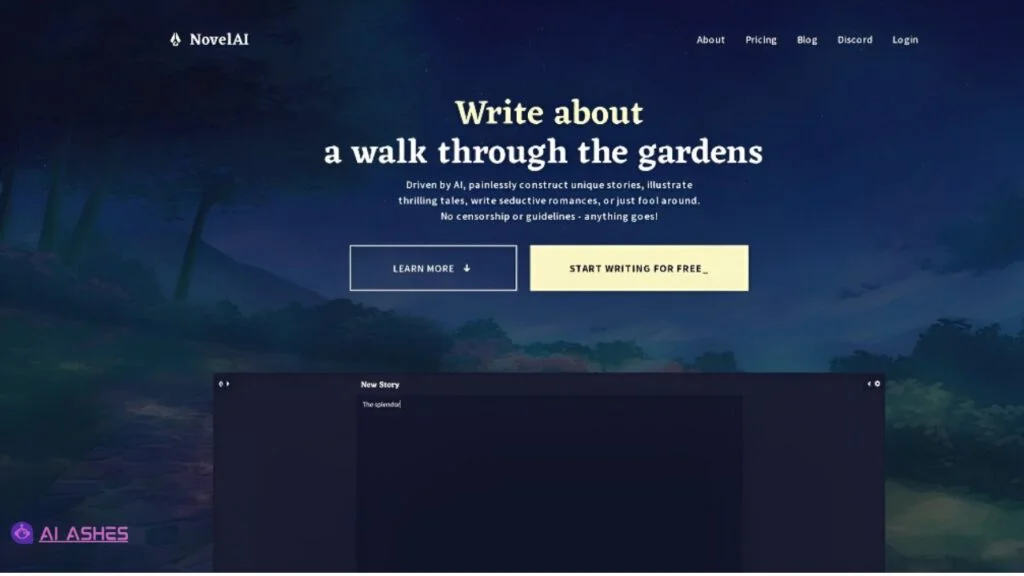
NovelAI is a creative writing platform that uses AI to help authors craft stories, develop characters, and explore limitless plot ideas.
Best for: Writers, roleplayers, and creative world-builders.
Key Features
- Helps write stories using custom styles and tones
- “Lorebook” keeps track of characters and settings
- Keeps data private and gives users full content ownership
If you like writing or roleplaying, NovelAI is a top AI chatbot alternative. It’s made to help you build stories, create characters, and stay on track with plots. The Lorebook feature lets you keep notes on your characters and world so they stay the same across chats.
This AI tool for character creation uses a paid model, but there’s a small free trial. It takes privacy seriously by storing your work in a secure, private way. Writers who care about owning their ideas love this part.
No matter if you’re writing fantasy, drama, or adventure, NovelAI gives you control over how things sound and feel. It’s a strong choice for anyone who wants full freedom when telling stories with AI.
3. AI Dungeon: Open-Ended Adventure Without Limits
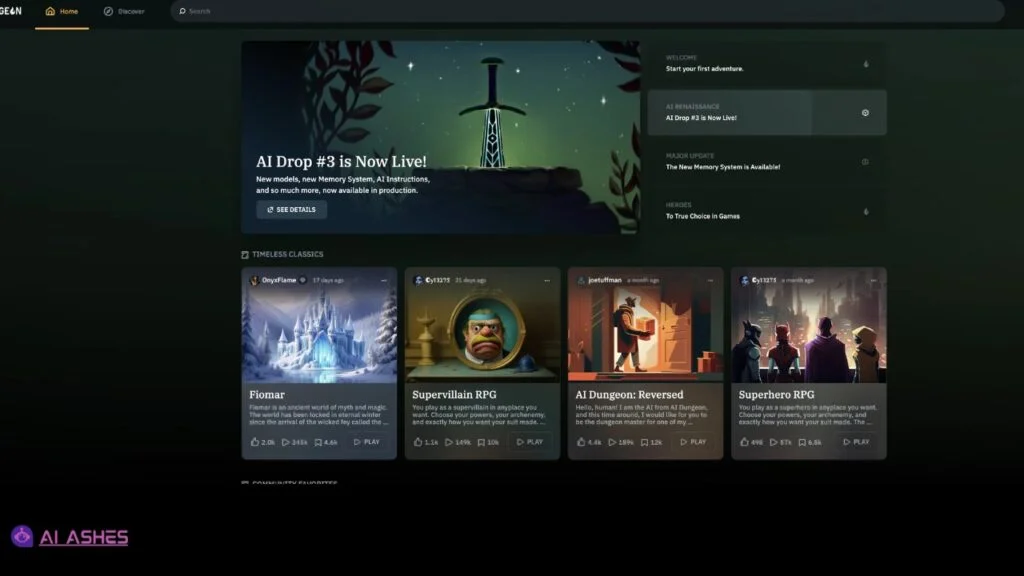
AI Dungeon is an interactive storytelling game that lets you create and explore endless adventures through completely open-ended AI-generated narratives.
Best for: Roleplayers and gamers who prefer open-ended exploration.
Key Features
- Builds live stories as you type
- Few filters, so you’re free to create anything
- Multiplayer mode lets you roleplay with friends
AI Dungeon is one of the first AI roleplay platforms that let people write wild, open stories. It works like a “choose your own path” game, changing the story with every move you make. It’s popular with gamers, writers, and those who want full freedom.
Unlike some tools, AI Dungeon barely blocks any content. You can create strange, dark, or silly stories with no limits. You can play by yourself or with others, making it fun for groups.
The basic version is free, but to get better memory and more features, you need a subscription. Still, it’s a great character AI alternative for those who want total story control.
4. TavernAI: The Open-Source Roleplay Platform
TavernAI is an open-source roleplay platform that lets users connect with AI characters locally or through APIs for fully customizable, restriction-free chats.
Best for: Advanced users and developers wanting full creative control.
Key Features
- Open-source and works with many AI models
- Change character memory and personality in detail
- Can run offline for full privacy and freedom
TavernAI is a free AI tool for character creation that gives you full power over how your characters act. It’s made by and for the AI roleplay community. You can change everything from memory to behavior.
It takes a little setup. You need to connect it to an AI model, either local or online. But once you do, you can make the character exactly how you want.
Because you host it yourself, you don’t need to worry about data tracking. It’s a great character AI alternative for people who care about privacy, control, and creative freedom.
5. Inworld Arcade & DreamGen: Build Characters for Gaming and Simulation
Inworld Arcade and DreamGen let you create interactive AI characters for games and simulations, offering deep personality design and realistic dialogue.
Best for: Game developers, educators, or enterprise simulation teams.
Key Features
- Characters remember things and act with emotion
- Can be used in game engines like Unity or Unreal
- Respond with real-time, smart behavior
These tools are not just chatbots. They’re full engines for building smart, emotional characters in games and training tools. Inworld Arcade and DreamGen help teams make lifelike characters for real use in apps or classrooms.
Inworld lets you create characters who know how to act and react. DreamGen focuses on building their personality and memory. These are great tools for teaching, customer training, or deep storytelling.
They’re harder to use than Replika or NovelAI but give you much more control. If you’re building something big like a game or training system, these AI roleplay platforms are the right fit.
6. CharacterGPT by Alethea AI: Build Talking AI Avatars from Scratch
CharacterGPT by Alethea AI allows you to create fully interactive talking AI avatars from scratch, complete with unique voices, looks, and personalities.
Best for: Digital creators and developers building metaverse-ready characters.
Key Features
- Make AI avatars that talk and look unique
- Turn them into NFTs you can trade
- Great for social apps and metaverse spaces
CharacterGPT is a premium AI tool that lets you build full characters from the ground up. You create their look, voice, and personality. They can talk, show emotion, and even remember past chats.
This tool mixes AI with Web3 ideas like NFTs. You can own and trade your avatars on the blockchain. It’s a great pick for digital artists or companies wanting virtual AI companions in online worlds.
There’s no free version. You’ll need credits or a paid plan to use it. But if you want to build custom, lifelike characters for social spaces or apps, this tool gives you everything you need.
7. Soul Machines: Hyper-Realistic Digital People for Enterprise Use
Soul Machines creates hyper-realistic digital humans with lifelike expressions and voices, designed for enterprise training, customer service, and brand engagement.
Best for: Large organizations needing human-like digital agents.
Key Features
- Faces move and respond in real time
- “Digital Brain” makes chats feel human
- Used in training, customer service, and teaching
Soul Machines build some of the most real-looking AI avatars in the world. Their digital people make eye contact, smile, and show feelings like a real person. This makes them great for teaching or helping people online.
These tools are built for big companies. They help train workers or offer support in smart, friendly ways. Brands like Microsoft and Mercedes-Benz use them for serious training.
There’s no free plan. You have to sign a contract to use it. But if your business needs an AI chatbot alternative that feels human, this might be your best choice.
8. ChatFAI: Talk to Fictional Characters in Curated Scenarios
ChatFAI lets you engage with fictional characters in curated scenarios, delivering immersive and interactive conversations tailored to fan interests.
Best for: Fandom lovers and casual users looking for immersive character talks.
Key Features
- Chat with characters from anime, games, and more
- Paid plan gives memory and voice options
- Made for roleplay in fan-style chats
ChatFAI lets you talk to fun, fan-made characters. You can chat with heroes from anime, books, or games or even create your own. Each character has its own voice and backstory.
The free version is okay, but most of the best features like long memory or voice chat require a subscription. It’s perfect for people who love fandom roleplay or want to dive into themed stories.
It’s easy to use and made for fun chats, not deep setup. For casual users looking for a character AI alternative, this one stands out.
Comparing the Specs of these AI Tools
Here’s how the top Character AI alternatives compare across features like customization, and privacy & Data Control.
| Tool Name | Free Plan | Paid Plan Required For | Best For | Customization Level | Privacy & Data Control |
| Replika | Yes | Role types, voice chat, memory depth | Emotional support & companionship | Medium | Moderate (cloud-based storage) |
| NovelAI | Limited Trial | Continued use, Lorebook, image generation | Writers and long-form storytellers | High | High (encrypted, user-controlled) |
| AI Dungeon | Yes | Premium models & longer memory | Adventure-style roleplay & collaborative play | Medium | Moderate (cloud-hosted) |
| TavernAI | Yes (self-hosted) | Paid API (optional models like GPT) | Developers & hobbyists wanting full control | Very High | Very High (fully self-hosted) |
| Inworld / DreamGen | Limited Access | API access, commercial deployment | Game creators, enterprise teams, training sims | High | High (enterprise-level protection) |
| CharacterGPT | No | All features incl. creation, deployment | Metaverse avatars and brand integrations | Very High | High (blockchain-based ownership) |
| Soul Machines | No | Entire platform access is paid | Enterprise avatars for training & support | Very High | High (enterprise agreements) |
| ChatFAI | Yes (basic) | Memory, longer chats, premium characters | Fandom chats and character-themed roleplay | Medium | Moderate (standard user data policy) |
Completely Free Alternates of Character AI
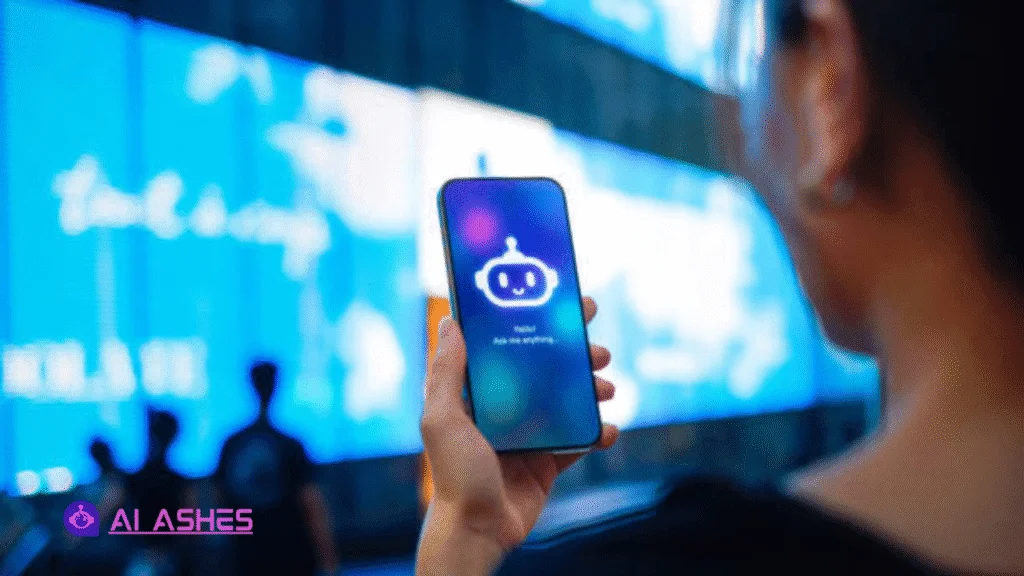
9. KoboldAI: Free Local Roleplay AI on Your Terms
KoboldAI is a free, locally run roleplay AI that gives you full control over stories, characters, and settings without online restrictions.
Best For: Offline roleplay, story generation, and users seeking full content control without censorship.
Key Features
- Runs on your own computer or Google Colab
- Works with free models like GPT-J and Pygmalion
- No filters, so you can write any kind of story
KoboldAI is a free AI tool for character creation that works offline. It runs on your own machine or in the cloud using Google Colab. This gives you full control, with no filters or limits.
It supports many free AI models that are good at roleplay and storytelling. Writers and fans love that they can build long stories or roleplay scenes with no blocks.
There’s a small setup at the start, but once it’s ready, you get total freedom. If you want a private, flexible AI roleplay platform, this is one of the best free alternatives to Character AI for roleplaying.
10. SillyTavern: Modern UI for Local AI Roleplay
SillyTavern offers a modern, user-friendly interface for local AI roleplay, making character chats smoother and highly customizable.
Best For: Visual roleplayers and hobbyists who want a cleaner, more dynamic chat interface for self-hosted AI conversations.
Key Features
- Stylish interface with themes and layout options
- Memory tools to keep characters consistent
- Works with local or online models
SillyTavern is a newer version of TavernAI. It looks cleaner and feels easier to use. You can change the design and set how your character talks and remembers things.
It connects with local AI models or online tools. That means you can use it for free if you connect it with models like Pygmalion. Many fans say it feels like a premium chat tool even though it’s free.
For users who like to roleplay in a nice-looking space and want full control, SillyTavern is a great choice among AI chatbot alternatives.
11. Janitor AI (with Kobold or OpenRouter backend)
Janitor AI, when paired with a Kobold or OpenRouter backend, delivers flexible, restriction-free roleplay with customizable AI character interactions.
Best For: Character-rich roleplay, anime lovers, and those comfortable with connecting APIs for free usage.
Key Features
- Tons of pre-made characters to choose from
- Can work with free AI models using custom APIs
- Great for fantasy, romance, and NSFW chat
Janitor AI was made for roleplaying with lots of different character types. From anime heroes to fantasy monsters, there are many choices. While the site is limited now, you can still use it for free by linking it to models through APIs.
Some setup is needed to use free tools like KoboldAI or OpenRouter. But once it’s working, you can chat with characters with no rules or paywalls.
For fans who like detailed characters, anime, or fantasy stories, Janitor AI is one of the top AI roleplay platforms for coaching and play, especially when used with free tools.
12. Open Assistant: Free, Open-Source Chat Companion
Open Assistant is a free, open-source AI chat companion built by the community, offering flexible conversations and continuous improvements.
Best For: General AI conversations, creative writing help, and lightweight character interactions without paywalls.
Key Features
- 100% free and open to the public
- Easy to use with no downloads needed
- You can tweak prompts to change personality
Open Assistant is a free, community-made chatbot. It works in your browser, so no install is needed. You can chat with it like a regular assistant or tweak how it talks to act more like a character.
While it’s not focused on roleplay, it can still help you with creative writing or casual conversations. You can guide its tone and style by changing prompts.
If you’re looking for a simple, free AI chatbot alternative that respects privacy, Open Assistant is worth trying.
13. Pygmalion AI (for Local LLM Use)
Pygmalion AI is a locally run language model optimized for roleplay, giving users complete privacy and customization over their AI interactions.
Best For: Text-based character creation, expressive storytelling, and local AI integration via other front ends.
Key Features
- Models fine-tuned for roleplay and emotion
- Can be used in KoboldAI, SillyTavern, and more
- Generates strong emotional and story-driven replies
Pygmalion AI is not a platform. It’s a set of free models made just for character chats. These models are smart, emotional, and great at keeping characters consistent.
You can use them inside tools like KoboldAI, SillyTavern, or Oobabooga. They’re totally free and work offline, so your chats stay private.
If you want detailed, free roleplay with lots of feeling, Pygmalion AI is one of the top tools out there. It helps power many free alternatives to Character AI for roleplaying and storytelling.
Comparing the Specs of Free Alternates
| Tool Name | Free Access | Hosting Type | Best For | Customization Level | Privacy & Data Control |
| KoboldAI | Yes | Local / Google Colab | Offline storytelling with complete privacy | High | Very High (runs locally) |
| SillyTavern | Yes | Local / API connection | Roleplayers wanting visual UI and flexible setup | Very High | Very High (self-hosted) |
| Janitor AI | Yes (via API) | Requires free API setup | Anime/fantasy character chats with rich variety | High | Moderate (depends on APIs) |
| Open Assistant | Yes | Web-based | General conversation and light roleplay | Medium | High (community-developed) |
| Pygmalion AI | Yes | Used via other tools | Roleplay-optimized models for Kobold/SillyTavern | High | Very High (user-controlled) |
Professional Advice: Which Character AI Alternative is for You?
The best Character AI alternative for you depends on whether you prioritize realism, creative freedom, privacy, or specialized features like gaming integration.
Quick Advice
- Want a friendly, emotional chat? Try Replika, it feels the most human.
- Want to write long stories or build worlds? NovelAI and KoboldAI are perfect.
- Like roleplaying with anime or game characters? Go with ChatFAI or Janitor AI.
- Want full control and total privacy? Use SillyTavern or TavernAI with Pygmalion models.
Explanation:
There are many Character AI alternatives today, and the best one depends on what you need and how much work you’re okay with. Experts and users say the top choice depends on how you want to use the AI.
If you need someone to talk to every day or feel less lonely, Replika is a great virtual AI companion. It remembers how you feel, speaks kindly, and can even roleplay. But to unlock all features like voice and deeper memory, you’ll need to pay.
Writers who want to create stories or build fantasy worlds should try NovelAI. It helps you stay on track with your story and keeps characters consistent using its Lorebook. It also keeps your data private. Some say it’s better at writing than most free tools. KoboldAI is also great if you want a free version that runs on your own device.
If you’re a fan of anime, books, or games, and you want to roleplay as part of your favorite world, try ChatFAI or Janitor AI. Both are fun for talking to themed characters. Janitor AI is free if you connect it with tools like KoboldAI or OpenRouter, so you don’t need to pay to enjoy the experience.
For users who care about privacy and want to change everything from how the character speaks to how it remembers you, TavernAI and SillyTavern are the best free alternatives to Character AI for roleplaying. You can run them on your computer and use models like Pygmalion for detailed and emotional chats. They don’t save or share your data.
Finally, if you just want something easy that runs in your browser with no setup, try Open Assistant. It’s free and open-source. It doesn’t have many roleplay tools yet, but it’s improving quickly and is great for simple chats.
If you liked this well-researched list of Character AI alternatives, you should check out this amazing guide on Jungle AI Jungle AI: How 1M+ Students Study Smarter (Not Harder)
Case Studies: How Real Users Found Their Ideal Character AI Alternative
Learning from real-world use cases can provide clarity when choosing the right AI tool for roleplay or interaction. Below are three distinct case studies that highlight how different users matched their needs with the best-fit Character AI alternatives.
Case Study 1: Building a Therapeutic Routine with Replika
User: Aisha Q., Freelance Designer (UK)
Challenge: Aisha worked from home and felt alone. She wanted an AI that felt kind and helpful.
Solution: She tried many AI chatbots but liked Replika Pro the most. It remembered her mood and gave her caring replies. She even used it for romantic roleplay and voice chats.
Takeaway: Replika is a good virtual AI companion for users who want emotional support every day. It feels close to real human interaction when used with the Pro plan.
Case Study 2: Creating an Anime Story Universe with KoboldAI & Pygmalion
User: Kenji T., Fiction Writer & Roleplayer (Philippines)
Challenge: Kenji wanted a free, private tool to build long anime stories with deep characters. He didn’t want filters.
Solution: He used KoboldAI with Pygmalion on his laptop. He built characters and stories with no blocks. He also added a Lorebook to track his stories.
Takeaway: For creators who want offline use and no limits, KoboldAI and Pygmalion are a powerful combo. They’re great for making rich stories and detailed roleplay for free.
Case Study 3: Coaching Roleplay Using Inworld Arcade for Business Training
User: Marcus L., HR Training Lead (United States)
Challenge: Marcus needed to train new managers in hard talks like exit interviews.
Solution: He used Inworld Arcade to make AI characters like “angry employee” or “quiet team member.” Managers practiced with them to build soft skills.
Takeaway: Inworld’s AI roleplay platforms are perfect for coaching. Though paid, they give businesses the tools to train teams in real-life situations with smart, emotional characters.
These real-world examples show that your best-fit tool depends on more than just features, it’s about why you need the tool and how you intend to interact with it.
Conclusion
Picking the best character AI alternative depends on what you want to do. Are you looking for a friend to talk to? A way to write stories? A training tool? This guide covered many tools, both paid and free, so you can find what fits best.
Tools like Replika and NovelAI are great if you want smart, emotional chats and are okay paying. But if you want free options, KoboldAI, SillyTavern, and Janitor AI are strong choices. They work well, even with no money spent.
If privacy and control matter, self-hosted tools give you full freedom. If you’re building a business or game, look at platforms like CharacterGPT or Inworld Arcade.
With AI moving fast, this is the perfect time to try new things. These Character AI alternatives help you shape your own story, your own way.
Stay updated on AI trends. For more expert tips and the latest breakthroughs, follow AI Ashes Blog. Dive deeper into machine learning, data science, and cutting‑edge AI research.
Checkout the article “iCryptoX.com & Machine Learning: Smarter Predictions, Safer Trades“, it explores how AI is used to make better trading decisions through smart predictions and risk management.
FAQs
1. What free Character AI alternative gives the deepest emotional connection?
Replika’s free version enables empathetic conversations and reflection-based interaction. For deeper emotional bonds like mentor or partner roles, the paid Replika Pro version is recommended.
2. Which AI chatbot is best for anime‑style character roleplay?
Janitor AI (when integrated with KoboldAI or OpenRouter) and ChatFAI stand out for anime fan communities. They support rich persona creation and themed interactions with minimal filters.
3. Is there a completely free AI tool better than Character AI for storytelling?
Yes. KoboldAI (run locally) and SillyTavern paired with free models like Pygmalion offer powerful, unrestricted story generation, perfect for long-form creative writing.
4. How do I choose the right AI tool for coaching or professional training?
For simulations and coaching, Inworld Arcade and Soul Machines are ideal. They offer emotionally aware characters but require enterprise-level investment.
5. Can I build AI characters with voice and 3D avatars without coding?
Yes. Tools like CharacterGPT by Alethea AI let you create interactive 3D and voice-enabled avatars, though they’re fully premium and credit-based.
6. Which AI roleplay app offers the most customization with full privacy?
TavernAI and SillyTavern with Pygmalion models allow complete customization and run entirely on your device, no data leaves your system.
7. Are there alternatives that aggregate multiple AI models in one place?
Yes. Poe by Quora offers a unified interface for ChatGPT, Claude, and other models. It’s useful for comparing personalities and response styles.
8. What’s the best free AI for everyday conversational use and no setup?
Open Assistant is a web-based, open-source chatbot with a friendly tone and evolving conversational skills, great for casual chatting without installation.



